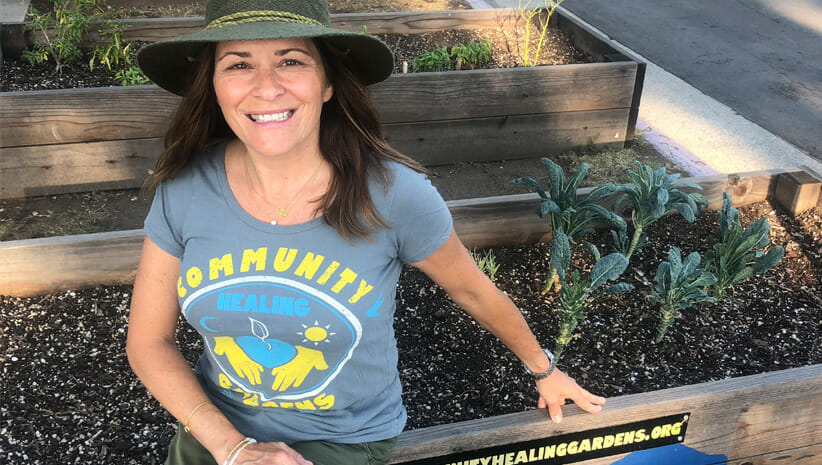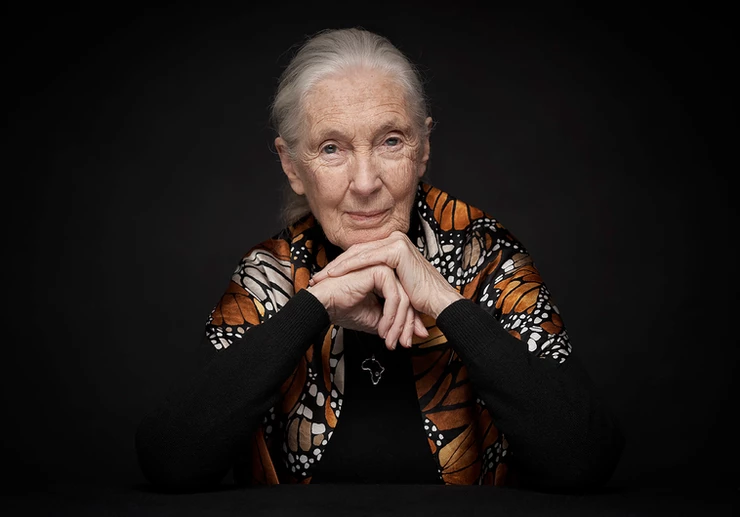Nicole Landers at Community Healing Gardens
Women Changing the Landscape of Our Cities
“Every patch of soil is an opportunity to grow food,” says Community Healing Gardens Co-Founder Nicole Landers. In the greater Los Angeles area, where the 365-day-a-year growing season means that there are abundant opportunities for everyone to be an urban gardener, Nicole is member of a pioneering group of women transforming the modern cityscape.
There are a number of good reasons to grow your own or to participate in community gardening efforts. You have an intimate relationship with the soil and can even contribute to soil remediation. You know where the seeds are coming from (and can even join groups like the Seed Library of Los Angeles) and can go even better than organic by controlling what is sprayed on the plants.

Community Healing Gardens
Urban gardening is a great way to bring communities together. Just ask Nicole Landers of Community Healing Gardens (CHG). The nonprofit started with garden boxes in the city spaces along the streets of Venice, where she resides. The raised beds offer opportunities for growing food that are open to the community that wanted — or more importantly needed — these opportunities. Now three years after founding the organization, there are 66 boxes sprinkled throughout Venice accompanied by after school programs developed to teach kids about gardening.
Nicole learned about urban gardening at UCLA where she studied under the Sustainable Certificate Program. Her interest sprouted as a kid, when she learned to grow tomatoes, herbs, basil, oregano, chives, onions, and spinach. Her father had a plot of land at a community garden space along the Westside Highway in NYC. She’s brought this passion to her present-day home community to address areas of food insecurity and food deserts throughout the southland. For example, CHG has partnered with the nonprofit St Joseph’s Center to use product harvested by CHG in the culinary program of the Center’s work experience kitchen, where they feed upwards of 100 homeless and transitioning men and women a day.
In Watts, CHG has stepped in to build an innovative relationship with the community’s only public middle school. They’ve cultivated the earth in one acre of land to grow food with their school farm and orchard program. CHG is teaching kids about the importance of growing their own food, showing how fun it is, and then giving that food back to the community. Anyone can participate through harvesting the food or joining in on community planting days. People can also adopt a box or a tree and learn about the beauty and necessity of urban gardening. “The one thing that binds us all is food. We all need nourishment and the food we put in our body fuels us.”
For more information, visit: communityhealinggardens.org.
Urban Gardening Q & A with Nicole Landers
What does gardening mean to you?
Nicole Landers: Farming means strengthening community through urban gardening. We can build connection, community, and jobs, and shift the consciousness on planetary and human health by growing food locally, especially in urban areas in need. Our soil can save us.
What is your favorite thing to grow?
NL: My favorite season is spring into summer and growing tomatoes, blueberries, strawberries, herbs, kale, and arugula.
LA Urban Farms
LA Urban Farms
If you’ve always wanted a garden, but don’t have the space, a vertical garden may be for you. LA Urban Farms has created state-of-the art, patented, vertical technology that allows you to farm in an urban setting using 90% less land and 90% less water.
Wendy Coleman is the founder of LA Urban Farms with partners Jennifer Crane and Melanie Dorsey. These three women share a passion for farming and helping others grow their own healthy food. Wendy found her work passion with the help of her daughter who was majoring in sustainability and environmental awareness.
Wendy came across vertical gardens growing right in the middle of a parking lot in front of a café. She inquired about buying one for her daughter Jess’s birthday. One vertical garden turned into three in the family’s backyard. “We had never had our own edible garden before; we even had fake plants in our house.” Wendy and her family couldn’t believe that in only 21 days they had the most delicious leafy greens and herbs for their smoothies, salads, and grilled vegetables.
Shortly after that harvest, they collaborated with the developer of the vertical garden technology, Tim Blank. Tim worked for 12 years as the chief horticulturist and greenhouse manager at Walt Disney World’s attraction The Land at Epcot Center. There, they grew hundreds of different food crops from all over the world in many different hydroponic and aeroponic systems. Wendy felt that her team’s enthusiasm combined with Tim’s expertise was a recipe for success. Thus, LA Urban Farms sprouted.
They created their first aeroponic farm on the rooftop of the old Google building in Santa Monica. It was the first of its kind on a commercial office building in LA. Now, almost five years later, their urban gardens are found in backyards, greenhouses, and with top chefs at restaurants, resorts, universities, and businesses throughout LA and beyond. They’ve even installed a garden at LA Mayor Eric Garcetti’s home.
For more information visit: laurbanfarms.com.
Urban Gardening Q & A with LA Urban Farms
What does farming mean to you?
Melanie Dorsey: Farming is about making a personal connection to your food while also connecting to people who are passionate about growing their own food. My hope is that more people connect to how their food is grown and become inspired to make healthier choices for themselves and the environment.
What is your favorite thing to grow?
MD: My favorite thing to grow is cucumbers. I have three daughters and my six-year-old Ellie adores pickles! She loves to grow her own cucumbers and educate everyone she meets about how to grow your own food. I enjoy teaching in my girls’ schools and seeing the joy on the children’s faces when they eat food that they’ve grown. They feel so proud. Another favorite is edible flowers. My girls love putting them in ice cubes for their lemonade stand, and also making soap with them.
Chef Helene Henderson of Malibu Farms
Malibu Farms Restaurant
If you just want to enjoy the bounty from area farms, try the incredible farm-to-table meals in a magical setting at Malibu Farms Restaurant on the Malibu Pier. Chef Helene Henderson started with cooking classes and farm dinners out of her home and backyard. Now, her backyard is on the Malibu Pier and includes a casual counter service café at the end of the pier and a full service restaurant and bar at the beginning of the pier. She also has locations in Orange County, Hawaii, and Florida.
Helene loves the simplicity of both gardening and cooking. The heart of her business is to serve simple, healthy, homestyle cooked meals without becoming too fussy. Where she grew up in the northern part of Sweden, Helene was always gardening. The family had their own potato community garden plots and strawberry pots on their city balcony. When she moved to Hollywood, Helene would manage to find space for a small garden, and even raised backyard chickens. Helene says, “Gardening is easy and gardening is hard. Some seasons are a breeze and others are a struggle. There really isn’t any right or wrong. Hopefully most times, you reap what you sow, and eat what you grow.”

For more information, visit: malibu-farm.com
Urban Gardening Q & A with Chef Helene Henderson
What does farming mean to you?
Chef Helene Henderson: Farming means everything. Farming even on the smallest scale, means the ability to feed yourself and others. Food does not come from the market. If we can forage food, and if we can grow food, we can grow.
What’s your favorite thing to grow?
HH: My favorite thing to grow is arugula, because snails don’t eat it, rabbits don’t eat it, coyotes don’t eat it; so it is all for me to eat with a squirt of good olive oil, a sprinkle of coarse salt and a squeeze of lemon.
Growing Your Own
As Chef Helene Henderson says, food does not come from the market. Food comes from the soil, even if it’s in a pot on a windowsill or balcony. Urban gardening can lead the way for families to eat better. Planting some seeds wherever you can find a small plot to call your own or sharing a space with your community are good places to start.
And there are many ways you can become more involved in urban gardening. Sponsor a Community Healing Gardens box. Volunteer or participate in a harvest. Exchange seeds. Take a gardening class. Look into building your own raised beds. Call LA Urban Farms. Or find ways to support local farmers and gardeners who are innovating organic and local farming. Join these women and be part of the next wave planting the seeds of change in backyards and communities.



